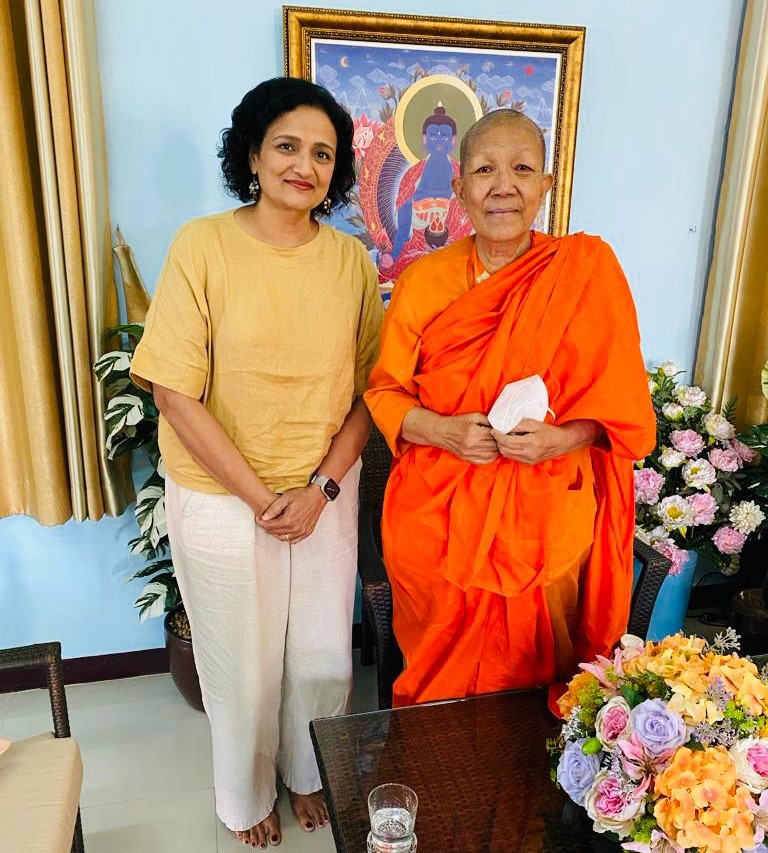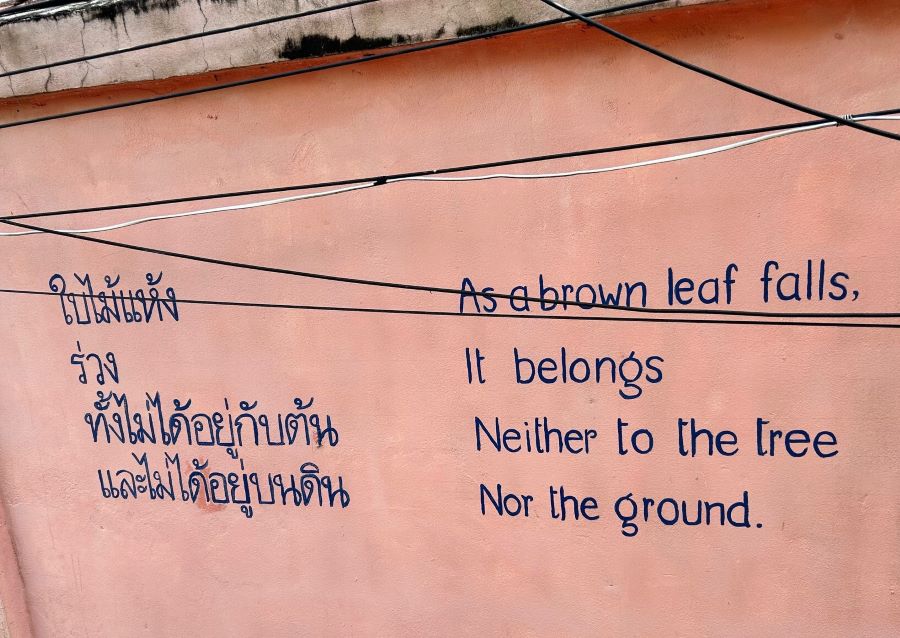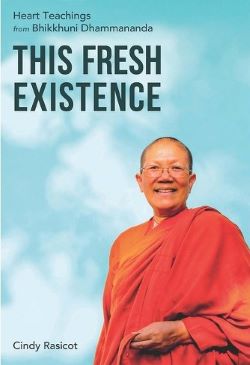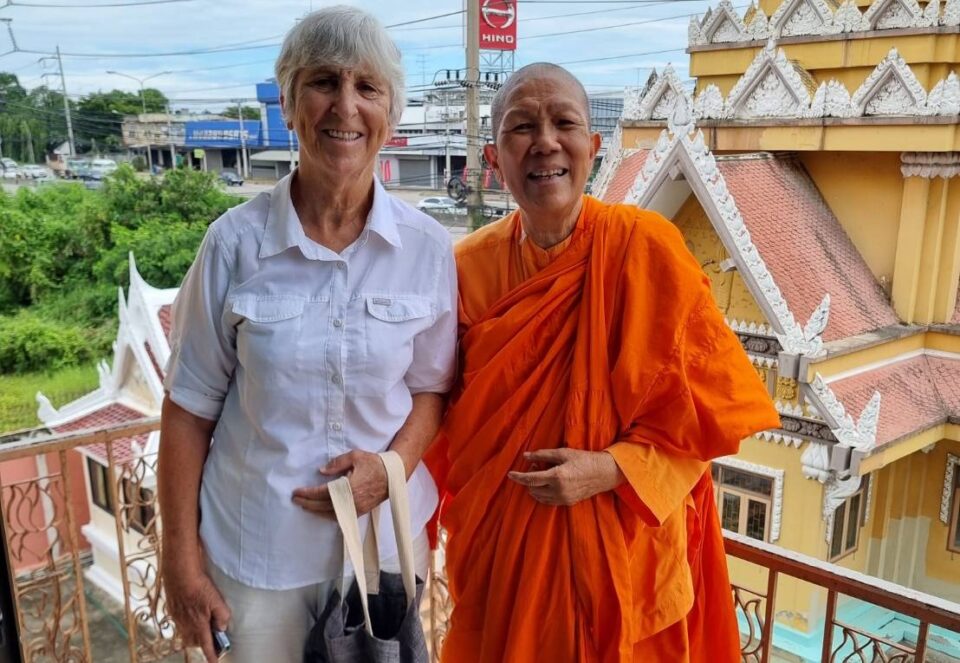Cover photo: The author, Cindy Rasicot, with Venerable Dhammananda.
BY VEENA RAO*
My introduction to Venerable Dhammananda began with Cindy Rasicot’s memoir, “Finding Venerable Mother,” during the 2020 pandemic. Last year, I was fortunate to be invited to interview Venerable on Cindy’s podcast, Casual Buddhism. Finally, in December 2023, I had the pleasure of meeting Venerable in person at the Wat Sondhammakalyani monastery in Nakhon Pathon where she resides.
It was a wonderful experience. Venerable graciously made time for us, despite having a prior commitment to visit her son in the hospital that morning. She was very interested in learning more about us. She discussed her relationship with India. Venerable’s serene and warm presence made our conversation a genuine joy. Following our meeting, we were invited to join the communal vegetarian lunch at the monastery.

Leaving the monastery, I carried with me, not only a warm heart but also a book authored by Venerable—an engaging collection of letters she wrote to her siblings during her student years at Shanti Nilaya in West Bengal in the 1960s. Reading these letters provided me with a glimpse into the mind of a typical, vulnerable teen who would go on to create history as one of the most recognized female Buddhist leaders in her country and the broader Buddhist world. The collection also offered me a window into the India of the 1960s and 70s, adding depth to my understanding of both her personal journey and the historical context that shaped her trailblazing path.
When Cindy offered me the opportunity to review her second book, “This Fresh Existence: Heart Teachings from Bhikkhuni Dhammananda,” I eagerly accepted, driven by my new personal connection to this remarkable woman.

The book is divided into three parts, each providing valuable insights into Venerable Dhammananda’s life, teachings, and the significance of women’s ordination in Theravada Buddhism. Part I is about her personal journey, struggles, and achievements, including her groundbreaking ordination as the first fully ordained Thai woman in the Theravada tradition. Part II offers wise teachings on forgiveness, compassion, and coping with uncertainty, presented with simplicity and clarity derived from her extensive worldly experiences. Part III explores the role and importance of ordination for women, providing a thoughtful reflection on the author’s own experiences with temporary novice ordination.
Cindy introduces the narrative with her first meeting with Dhammananda in 2005, capturing the unexpected spiritual journey that unfolded during her family’s relocation to Bangkok.
Venerable Dhammananda, previously known by her lay name, Dr. Chatsumarn Kabilsingh, did not begin to think seriously about being ordained until her mid-fifties. At the time she had enjoyed a highly successful career as a professor of Buddhist studies for twenty-seven years at Thammasat University, was a well-known media personality who hosted a popular TV dharma show, and had been married for thirty years with three adult sons.
The book sheds light on Dhammananda’s late-life decision to pursue ordination after a successful career, showcasing her unique ability to make complex Buddhist teachings accessible through clear language and personal anecdotes.
One striking aspect is the exploration of the mother-daughter relationship, revealing Dhammananda’s complex connection with her own trailblazing mother, Venerable Voramai who founded the Wat Songdhammakalyani Temple (the first temple in Thailand established by and for Buddhist women), and an orphanage and school for children. The author’s personal reflections on the shared struggles of loneliness, insecurity, and the journey towards forgiveness create a relatable and emotionally resonant narrative.
The book also addresses the ‘bhikkhuni debate’ and the media frenzy surrounding Dhammananda’s ordination in Sri Lanka, providing a fascinating glimpse into the challenges she faced and the public scrutiny she endured.
Throughout the book, the importance of meditation is emphasized, with Dhammananda highlighting Buddhism’s unique approach to training the mind. Practical meditation tips, discussions on the four brahmaviharas, and insights into letting go of the self, contribute to the book’s richness.
Also included are Venerable’s thoughts compiled from episodes of Cindy’s Casual Buddhism podcast, on compassion, forgiveness, jealousy, despair, loneliness, craving, grasping or clinging, uncertainty, aging etc.
The concluding section touches upon the monastic experience and the concept of ‘no-self,’ offering readers a glimpse into a different world and the sacred abundance of life that accompanies temporary ordination.
The book concludes with Venerable Dhammananda’s impassioned Afterword, urging collective action against societal injustices, particularly those perpetuated by patriarchy. Her call for unity to bring about social change resonates powerfully, emphasizing the book’s broader significance beyond individual spiritual journeys.

In “This Fresh Existence,” Cindy Rasicot skillfully weaves together personal narratives, teachings, and reflections, creating a compelling and inspiring portrait of Venerable Dhammananda. The book serves not only as a valuable resource for those seeking Buddhist wisdom but also as a call to action in dismantling societal barriers that impede progress and equality, especially for women.
*Veena Rao is the founding editor of NRI Pulse and the author of Purple Lotus.





